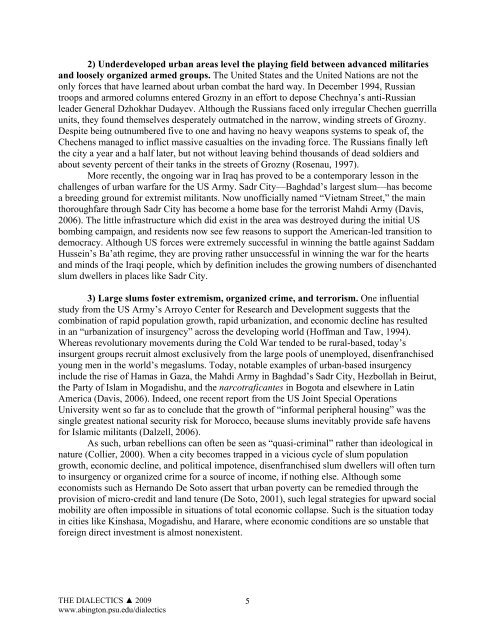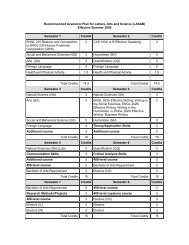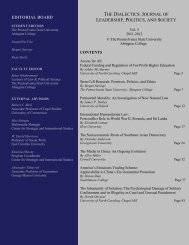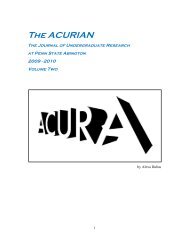Vol. III - Penn State Abington
Vol. III - Penn State Abington
Vol. III - Penn State Abington
Create successful ePaper yourself
Turn your PDF publications into a flip-book with our unique Google optimized e-Paper software.
2) Underdeveloped urban areas level the playing field between advanced militaries<br />
and loosely organized armed groups. The United <strong>State</strong>s and the United Nations are not the<br />
only forces that have learned about urban combat the hard way. In December 1994, Russian<br />
troops and armored columns entered Grozny in an effort to depose Chechnya’s anti-Russian<br />
leader General Dzhokhar Dudayev. Although the Russians faced only irregular Chechen guerrilla<br />
units, they found themselves desperately outmatched in the narrow, winding streets of Grozny.<br />
Despite being outnumbered five to one and having no heavy weapons systems to speak of, the<br />
Chechens managed to inflict massive casualties on the invading force. The Russians finally left<br />
the city a year and a half later, but not without leaving behind thousands of dead soldiers and<br />
about seventy percent of their tanks in the streets of Grozny (Rosenau, 1997).<br />
More recently, the ongoing war in Iraq has proved to be a contemporary lesson in the<br />
challenges of urban warfare for the US Army. Sadr City—Baghdad’s largest slum—has become<br />
a breeding ground for extremist militants. Now unofficially named “Vietnam Street,” the main<br />
thoroughfare through Sadr City has become a home base for the terrorist Mahdi Army (Davis,<br />
2006). The little infrastructure which did exist in the area was destroyed during the initial US<br />
bombing campaign, and residents now see few reasons to support the American-led transition to<br />
democracy. Although US forces were extremely successful in winning the battle against Saddam<br />
Hussein’s Ba’ath regime, they are proving rather unsuccessful in winning the war for the hearts<br />
and minds of the Iraqi people, which by definition includes the growing numbers of disenchanted<br />
slum dwellers in places like Sadr City.<br />
3) Large slums foster extremism, organized crime, and terrorism. One influential<br />
study from the US Army’s Arroyo Center for Research and Development suggests that the<br />
combination of rapid population growth, rapid urbanization, and economic decline has resulted<br />
in an “urbanization of insurgency” across the developing world (Hoffman and Taw, 1994).<br />
Whereas revolutionary movements during the Cold War tended to be rural-based, today’s<br />
insurgent groups recruit almost exclusively from the large pools of unemployed, disenfranchised<br />
young men in the world’s megaslums. Today, notable examples of urban-based insurgency<br />
include the rise of Hamas in Gaza, the Mahdi Army in Baghdad’s Sadr City, Hezbollah in Beirut,<br />
the Party of Islam in Mogadishu, and the narcotraficantes in Bogota and elsewhere in Latin<br />
America (Davis, 2006). Indeed, one recent report from the US Joint Special Operations<br />
University went so far as to conclude that the growth of “informal peripheral housing” was the<br />
single greatest national security risk for Morocco, because slums inevitably provide safe havens<br />
for Islamic militants (Dalzell, 2006).<br />
As such, urban rebellions can often be seen as “quasi-criminal” rather than ideological in<br />
nature (Collier, 2000). When a city becomes trapped in a vicious cycle of slum population<br />
growth, economic decline, and political impotence, disenfranchised slum dwellers will often turn<br />
to insurgency or organized crime for a source of income, if nothing else. Although some<br />
economists such as Hernando De Soto assert that urban poverty can be remedied through the<br />
provision of micro-credit and land tenure (De Soto, 2001), such legal strategies for upward social<br />
mobility are often impossible in situations of total economic collapse. Such is the situation today<br />
in cities like Kinshasa, Mogadishu, and Harare, where economic conditions are so unstable that<br />
foreign direct investment is almost nonexistent.<br />
THE DIALECTICS ▲ 2009<br />
www.abington.psu.edu/dialectics<br />
5







